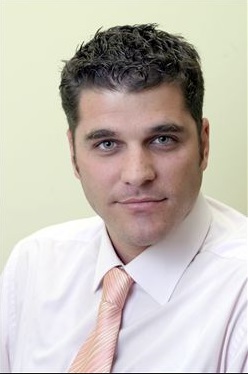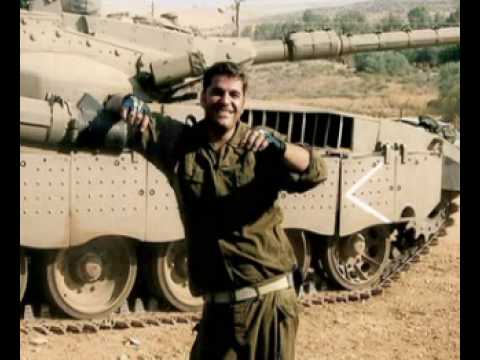


In memory of Nimrod Segev
Born in Rosh Pina, 11th of Cheshvan, 5738 (October 23, 1977). Fell in Ayta ash Shab, Lebanon, 15th of Av, 5766 (August 9, 2006)
“Dad, I’ve got to go. That’s how you brought me up, isn’t it?” Nimrod Segev, who fell in the Second Lebanon War, knew that he would come back in a coffin and nonetheless returned to the battlefield.
Nimrod joined the army on the last day of March in 1996 and served in the Armored Corps. After his release from the army, he studied hi-tech in Herzlyia and became a certified computer engineer with Microsoft, where he worked until his last day. He loved the good life and the simple life—the connection to nature, to one’s roots and to the scenery of his birthplace.
In the Second Lebanon War, Nimrod was called to reserve duty and went up to Lebanon as a loader on a Merkava tank. On August 9, 2006, he was killed in battle in Southern Lebanon after his tank, which was protecting tractors that were paving a new road to the village of Ayta ash Shab, was damaged by a roadside device and then hit by an antitank missile. The explosion of the missile and the ammunition in the tank killed Nimrod and the rest of the crew. Nimrod was 28. He was buried in the military cemetery in Rosh Pina. He left behind a wife, a son, parents and a brother.
After his death, he was promoted to Sergeant First Class. On his tombstone is a line from a poem he wrote four days before his death entitled “Called up”: “In the end, you fight, like an animal / in order to live, for the sake of inner peace.”
 Nimrod Segev z"l |
In view of Nimrod’s great love for Rosh Pina and nature, the family decided to commemorate him by establishing Mitzpe Nimrod—a memorial park that also serves as an observation point over the Galilee and the Golan Heights. It is a starting point for hikes in the reconstructed site of Rosh Pina. “Nimrod was fourth generation on the moshava. He loved the moshava and was connected to it with every fiber of his body,” his parents recount. “When he would come to visit on the weekend with his beloved wife Iris and his young son Omer, and the stream was flowing into the moshava a few meters from the house, he would stop the car and look at the scenery and listen to the hypnotizing sound of the water. He would drive at less than a kilometer an hour on the shortcut home, so that he could slowly breathe in the air of this place, in which he grew up. Mitzpe Nimrod will preserve Nimrod’s simple charm, his love of his fellow men and his love for nature, by means of its pleasant-to-the-eye design, its calm, its incredible view and its flowing water that will contribute to the feeling of ‘life goes on’.”
Interview with Iris, Nimrod's wife
It is said of the dead that they were the “best in the world”, but Nimrod really was. He died Tu B'Av, Jewish Valentine’s Day, and left me with a love that will never end. Nimrod was my whole world. He was my reason for life and my beloved. Two years after we got married, I had our son Omer. Every day, every hour and every minute with Nimrody were indescribable joy and I am not exaggerating. That is how it really was. We lived every moment as if we knew that our time was limited. As if there was no tomorrow. I felt that beyond his being a loving husband and a real friend, he was the father that I never had, who I lost when I was a child.
Nimrod insisted on going to war even though I begged him not to. When he was called up and there wasn’t any drinking water, Nimrod’s father Hezi came to the staging point to bring him bottles of water. Nimrod, who always thought of everyone else first, gave away all of the water and got dehydrated and even needed hospitalization. Nonetheless, he would not give up on reserve duty. On the night before he was killed, he made a surprise visit to the house. I danced with happiness when he arrived. We ate dinner together—the whole family, and in the morning before we parted we went out for breakfast. We loved to talk endlessly but this time we held hands and were quiet. We parted with hugs and kisses. When I cried, Nimrod said: “Hey little one, everything is fine.”
A few hours later, when he didn’t call, I called him and he said he couldn’t talk. I sent him a message: “Love you” and he answered, “Love you more.” The next day, in the afternoon, I felt a terrible pain in my chest. I was beside myself. I went out to the street and shouted, “My husband is in Lebanon. Something terrible has happened to him.” That night, the 15th of Av—Jewish Day of Love—the officers knocked on our door.
 |
Interview with Hezi Segev, Nimrod's father, about his last memory of Nimrod
Thoughts from Neko Productions who created the film
When we started working on the animated clip based on the story of Nimrod Segev, we experienced a huge shock. Nimrod’s vision of what will happen to him when he returns from the war makes his death look like a tragedy that was foreseen, and it hits you like a punch in the gut. There is also a strong feeling of connection between the father and his son and of a calling that the father has passed on to his son. And maybe it was that which pushed Nimrod to be faithful to the way he had been brought up and to return to the battlefield. We could identify with the feeling of loss of someone close and were able to connect it to the father-son relationship.
One of our sources of inspiration was the animated film “Waltz with Bashir”, which also describes a difficult story and was about members of the Armored Corps. The animation opened up many possibilities for us, beyond what a feature film could do, such as the transition between scenes and the transformation of various elements. We made sure to keep the animation smooth-flowing rather jumping around like often happens in the genre. The spectrum of colors also had to be low-key, especially in the emotionally difficult parts. And first and foremost, all of the artistic choices had to serve the story.
We chose to describe the story by way of the thoughts that go through the father’s head as part of his coping with the loss of his son, and we imagined this as a disconnected mix of memories, sentence fragments, good and bad experiences and thinking about the end. We thought about how Nimrod’s family would react to the way in which things are presented and we hoped that they would connect with the final product and would feel that it belongs to them. We hope that the viewers will connect with the story and that its intensity is felt. Although the clip describes the story of a specific father and son, it touches on a more general issue of loss, which is felt by all of us.